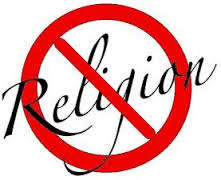“God Hates Religion”
The message of the Bible is that God hates religion. The great Reformed theologian Karl Barth wrote those words. They’re striking. “The message of the Bible is that God hates religion. [What] we must say [of religion] is that it is the one great concern of godless men” (Church Dogmatics, vol. 1).
The young Karl Barth loved to say this, perhaps because he was a pastor in a Swiss village that thought of itself as properly religious. (The Swiss aren’t the only ones who imagine that life can—or ought to!—run like a fine watch.)
Barth understood that religion could be either life-giving or, when it went bad, death-dealing. He could hear the Lord’s cry to the Israelites, “I hate, I despise your religious festivals; your assemblies are a stench to me” (Amos 5:21)—because ritual and observance had ruled out justice and compassion. He could see Jesus overturning the tables of the money changers, because what was meant to be a “house of prayer” had become Big Business. He knew each parable from Jesus’ mouth, almost every one of which stands in opposition to conventional morality and general niceness, where the “religious” people are the losers and the “sinners” win. “Two men went up to the temple to pray….”
Famously, Barth preached a sermon entitled “The Yoke of Religion.” His text was Matthew 11:28-30: “Come to me, all who are weary and heavy-laden, and I will give you rest. Take my yoke upon you and learn from me, for I am gentle and humble in heart, and you will find rest for your souls. For my yoke is easy and my burden is light.” Barth stood in the pulpit of that tidy Swiss village and said, “The burden [Jesus] wants to take from us is the burden of religion.”
Isn’t it amazing that religion—in all its demands and rules, its fierce enforcement of orthodox belief and holiness codes—morphs into its opposite? Now it is not the thing that can lead you to life; it is the thing from which you need to be delivered.
Most people have labored under the yoke, the burden of religion. They have tried to measure up and have failed. They have called themselves believers and been riddled with doubt. They have felt ostracized or condemned. In response, they have redoubled their efforts and tried even harder to be faithful, to finally meet the demands, to gin up enough faith to qualify as a “true” believer. But it hasn’t worked. They have abandoned a life of faith because they figure they are just too sinful. If only they could be delivered from their sin . . . .
Jesus came, Barth declared, to deliver us (can we say it?) not from our so-called sin but from the religion that laid that heavy burden upon us. It’s ironic—comic—that we needed a savior to deliver us from religion! But that is the gospel truth.

Bonhoeffer was right about religionless Christianity. I think this is a discussion we will be having for a couple of generations while things get sorted out. If we try to cling to what is past, we’ll fail. Didn’t Jesus say something like that to Mary?
Yes–I forgot about Bonhoeffer on this matter. Thanks
Well done David. Pure religion too soon becomes impure. Did you see that article in Delancey Place today about the fight between Beecher and Finney? A gloss on this piece.
just read it–good example
Oh my. Thank you.
Religion overplayed overweights the yoke. Faith trumps religion.
In my world, the axiom is: Any strength overused is destined to be your greatest weakness.